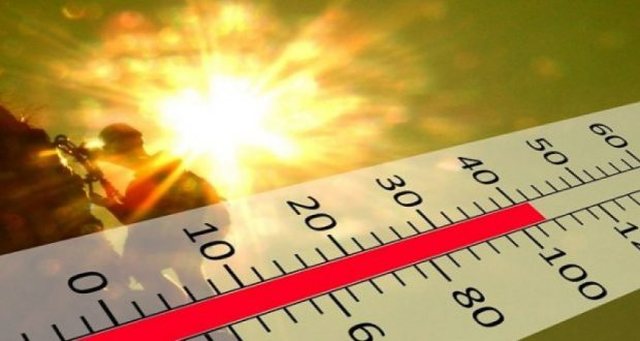
 Flash News
Flash News
The French footballer is declared the "player of the season" in the Champions League
Flames engulf the Darëzeza forest massif in Fier
Serious accident in Vlora, vehicle collides with two young people, one of them dies
Durrës Border Police find two tourists on a speedboat, one dead, the other in serious condition
Car hits motorbike, 25-year-old dies in Bilisht
Study: Half of the world experienced one more month of summer in 2024

The Earth is increasingly burning under the influence of global warming caused by human activities, while a recent study has found that half of the world's population, approximately four billion people, has experienced at least 30 more days of extreme heat over the past year, compared to the base period 1991-2020.
The study was published on the eve of World Day of Action Against Heat, on June 2, and comes as a stark warning about the growing impact of climate change. The research was carried out by an international collaboration of scientists from World Weather Attribution, Climate Central and the International Red Cross, who analyzed the period from May 2024 to May 2025.
According to the study, 67 episodes of extreme heat were recorded in this one-year period, all linked to the impacts of human-induced global warming. These days of extreme heat were defined as those in which temperatures exceeded 90% of the average temperatures of the years 1991-2020 in a given location.
"With every ton of CO₂ released and every barrel of oil burned, heat waves will affect more and more people," warns climatologist Friederike Otto of Imperial College London, author of the report.
One of the hardest-hit areas was Aruba, an island in the Caribbean, where residents experienced 187 days of extreme heat, 45 days more than would be expected in a world without global warming.
While the global average temperature in 2024 symbolically exceeded the Paris Agreement's 1.5°C limit, the consequences of this increase are being felt more strongly than ever. The year 2024 was confirmed as the hottest ever recorded, surpassing the record of 2023, and the start of 2025 has also been alarming, with the hottest January in history.
The consequences are not only climatic, but also health. In Europe, extreme heat claimed the lives of more than 61,000 people during the summer of 2022. However, in many developing countries, accurate data is lacking. According to the authors of the study, a large number of deaths from heat are wrongly categorized as a result of other diseases, such as heart or respiratory diseases.
The report raises the alarm about the lack of preparedness and response in most countries, especially in the poorest areas of the world, where the impacts of heatwaves are often not properly documented and addressed.
As temperatures continue to rise and heat waves become longer and more intense, the study calls for urgent measures to reduce the use of fossil fuels and strengthen health and civil protection systems against these extreme climatic conditions.
Latest news


"Russia could attack NATO in the next 4 years," warns German defense chief
2025-06-01 21:34:42
Kuçana: Opposition candidates have been threatened by "Rama's gangs in Shkozet"
2025-06-01 21:11:15


15-year-old injured in shooting at Ali Demi's pizzeria, details from police
2025-06-01 19:51:19

Russia accuses Ukraine of 'terrorist attack' on air bases
2025-06-01 18:57:24
A hospital in Hamburg, Germany, catches fire, killing three patients
2025-06-01 18:32:28
Nesho: Rama's autocratic regime has not allowed free elections to take place
2025-06-01 18:10:23
Moroccan immigrant's suicide, activist: There are inhumane conditions in Gjadra
2025-06-01 17:49:32
World Bank Report, PL: Confirms that the majority of Albanians live in poverty
2025-06-01 17:23:56

31 dead after Israeli attack near Gaza aid center
2025-06-01 16:40:30
At least 150 dead in Nigeria floods
2025-06-01 16:14:26
Flames engulf the Darëzeza forest massif in Fier
2025-06-01 15:56:41

SHBA-ja i dërgon Iranit një propozim për marrëveshje bërthamore
2025-06-01 14:54:11


Moroccan immigrant commits suicide, activists protest in front of Gjadri camp
2025-06-01 13:48:17
PSG victory celebrations turn into tragedy, two dead, over 500 arrested
2025-06-01 13:26:33

Kosovo-Albania arms trafficking, Tirana Court leaves 8 arrested in prison
2025-06-01 12:41:11
Foreign worker dies at work, engineer of construction firm arrested in Tirana
2025-06-01 12:20:27
Car hits motorbike, 25-year-old dies in Bilisht
2025-06-01 11:56:56

Why doesn't the Vatican recognize the state of Kosovo?
2025-06-01 11:22:07

22-year-old arrested in Durrës, cocaine doses found hidden in his car
2025-06-01 10:40:20
Merz to meet Trump in Washington on June 5
2025-06-01 10:18:13
Today, June 1st, is World Children's Day.
2025-06-01 10:01:13
Foreign exchange, the rate at which foreign currencies are sold and bought
2025-06-01 09:47:21
After the elections, the "fiscal peace" ends, the "war" begins
2025-06-01 09:24:30
PSG defeats Inter, grabs Champions League trophy
2025-06-01 09:08:08

Horoscope, what do the stars have in store for you today?
2025-06-01 08:40:10
Serious in Tale, Lezha! 57-year-old man executed in the yard of his apartment
2025-06-01 08:25:55
Temperatures up to 31 degrees Celsius, weather forecast
2025-06-01 08:15:33
Morning Post/ In 2 lines: What mattered yesterday in Albania
2025-06-01 08:01:33
Anemia increases in the population
2025-05-31 22:18:38
Elections, Noka: A farce took place in Albania on May 11
2025-05-31 21:44:55


Jola Hysaj after the result in Durrës: The vote may have been alienated
2025-05-31 20:37:16

He was shot by his compatriot in Podgorica, the young 23-year-old Albanian dies
2025-05-31 19:58:13


Ndërtime pa siguri? Humb jetën punëtori boshnjak në Tiranë
2025-05-31 18:59:42


Russian attacks kill at least seven people in Ukraine
2025-05-31 17:35:43
Study: Half of the world experienced one more month of summer in 2024
2025-05-31 17:10:40




Tragedy in Germany, small plane crashes into a residential complex, two dead
2025-05-31 15:24:43


Wanted by German authorities, 22-year-old arrested at Morina border crossing
2025-05-31 14:39:44

Threat or protection? Rama's stances towards SPAK spark contradictions
2025-05-31 13:54:59


The poisoning of children in Gramsh, proof of the destruction of state control!
2025-05-31 12:59:40

Car full of contraband cigarette cartons, 48-year-old arrested in Kapshtica
2025-05-31 12:30:43


All the people (patronage) police
2025-05-31 11:59:12
Dështon edhe seanca e 24-t, nuk ka konstituim të Kuvendit të Kosovës
2025-05-31 11:39:38



High flow of travelers at the Morina border crossing during the weekend
2025-05-31 10:20:31
Berisha will participate in the EPP Political Assembly in Brussels on June 3-4
2025-05-31 09:58:13


Today is the 24th attempt to constitute the Assembly in Kosovo
2025-05-31 08:58:30
Horoscope, discover the star forecast for your sign
2025-05-31 08:39:28
Weather forecast, how temperatures will vary throughout the day
2025-05-31 08:19:07
Morning Post/ In 2 lines: What mattered yesterday in Albania
2025-05-31 08:01:14



Bomb alert in a hotel in Tirana, what the police discovered
2025-05-30 22:05:17
The myth of 'eight hours of sleep' is debunked, here's what you need to consider
2025-05-30 22:01:55

For 7 million Lek maintenance pension, the bailiff seizes his house
2025-05-30 21:42:00



Video/ Bomb alarm in the parking lot of a hotel in Tirana, the police react
2025-05-30 20:59:35
Shots fired in Durres, one injured
2025-05-30 20:50:12
Bomb alert in the parking lot of a hotel in Tirana!
2025-05-30 20:25:46


